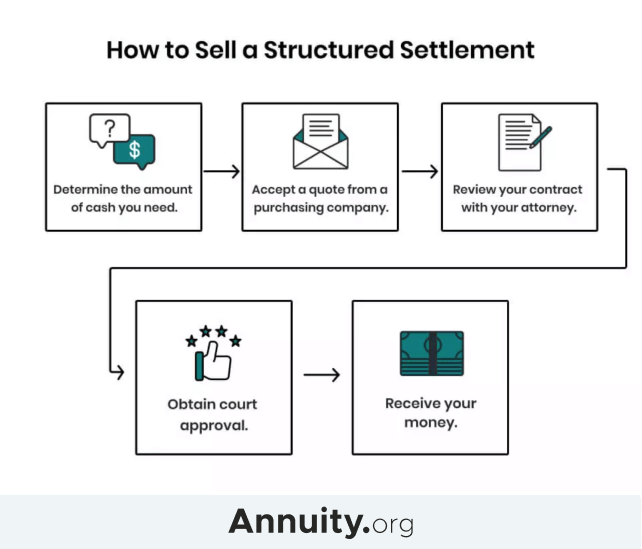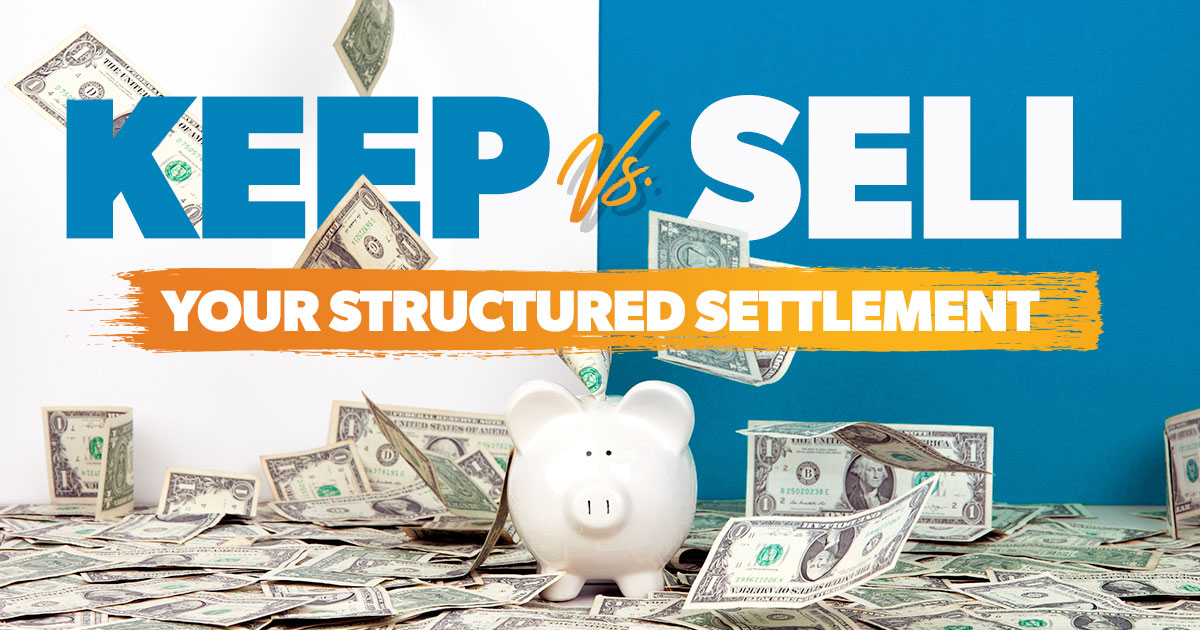Sell My Structured Settlement: Maximize Your Payout Today
To sell your structured settlement, contact a reputable company specializing in purchasing structured settlements. They will guide you through the process.
Selling a structured settlement can provide immediate access to cash, which is beneficial for various financial needs. Structured settlements often result from legal settlements and provide periodic payments over time. While they offer stability, unexpected expenses or financial goals may require a lump sum.
Reputable companies purchase these settlements, offering a one-time payment. It's crucial to research and choose a trustworthy buyer. The process involves legal steps to ensure compliance with state laws. Consulting financial advisors can help you make informed decisions. Selling your structured settlement can be a strategic move to achieve financial flexibility and meet pressing needs.
Introduction To Structured Settlements
Structured settlements offer a unique way to receive compensation. They provide financial security over a long period. Understanding structured settlements is vital if you need to sell one. This guide will help you grasp the basics and benefits.
What Is A Structured Settlement?
A structured settlement is a financial arrangement. It results from a legal case or insurance claim. Instead of a lump sum, you get payments over time. These payments are usually tax-free. They can be monthly, quarterly, or yearly.
Structured settlements are common in personal injury cases. They ensure the recipient gets steady income. This income can cover medical bills, living expenses, and other needs.
Common Uses And Benefits
Structured settlements have several uses and benefits. Here are the most common ones:
| Common Uses | Benefits |
|---|---|
| Personal Injury Cases | Provides a steady income stream |
| Workers' Compensation | Tax-free payments |
| Medical Malpractice | Ensures long-term financial security |
| Wrongful Death | Helps manage large settlements responsibly |
Here are some key benefits in bullet points:
- Predictable Income: Regular payments ensure financial stability.
- Tax Advantages: Most payments are tax-free, reducing tax burdens.
- Financial Security: Long-term payments help in managing finances better.
- Customization: Payment schedules can be tailored to meet specific needs.
Understanding these elements is crucial. It helps you make informed decisions about your structured settlement. Whether you keep it or decide to sell, knowing these basics is beneficial.
Reasons To Sell Your Structured Settlement
Selling your structured settlement can be a major decision. Structured settlements provide steady income. Yet, there are times you might need a lump sum of cash instead. Below are some key reasons why selling your structured settlement might be the right choice.
Immediate Financial Needs
Life can throw unexpected expenses our way. You might face medical emergencies. You may need to cover educational costs. Home repairs or urgent bills can also arise. In these situations, a structured settlement might not provide enough funds quickly. Selling your structured settlement can give you the cash needed immediately.
| Expense Type | Urgency Level |
|---|---|
| Medical Bills | High |
| Education Fees | Moderate |
| Home Repairs | High |
| Debt Payment | High |
Investment Opportunities
Investing can offer higher returns. Selling your structured settlement could provide capital for investments. Imagine buying real estate or starting a new business. These opportunities can yield higher returns than the periodic payments of a structured settlement.
Consider a diversified portfolio to reduce risk. Investing in stocks, bonds, or mutual funds can be beneficial. Below are some potential investments:
- Real Estate
- Stocks
- Bonds
- Mutual Funds
- New Business Ventures
Having a lump sum of money can open doors. It allows you to seize these opportunities and potentially grow your wealth faster.
How To Evaluate Your Settlement Value
Evaluating your structured settlement value can be complex. It’s essential to understand the factors that affect it. This guide will help you make an informed decision.
Factors Influencing Value
Several factors determine your settlement's worth. Here are the key elements:
- Payment Amount: Higher payments increase the settlement value.
- Payment Schedule: Frequent payments are more valuable.
- Discount Rate: Lower rates mean higher present value.
- Remaining Term: Longer terms reduce present value.
- Market Conditions: Economic factors can impact value.
Calculating Present Value
Calculating the present value helps you understand the worth today. Follow these steps:
- List all future payments.
- Determine the discount rate.
- Use the present value formula:
PV = PMT / (1 + r)^nWhere:
- PV: Present Value
- PMT: Payment Amount
- r: Discount Rate
- n: Number of Periods
Understanding these calculations helps you decide on selling your settlement.

Choosing The Right Buyer
Selling your structured settlement is a big decision. You want to get the most value. Choosing the right buyer ensures a smooth and profitable transaction. Below, you'll find tips on selecting a reputable company and spotting red flags.
Reputable Companies
Always choose a company with a good reputation. Reputable companies have positive reviews and strong customer testimonials. Look for a company that is licensed in your state. This ensures they follow all regulations.
Here are some key points to consider:
- Check online reviews on sites like Trustpilot and BBB.
- Look for companies with at least five years of experience.
- Ask for references from past clients.
- Ensure they offer transparent fee structures.
Red Flags To Avoid
Not all companies are trustworthy. Watch out for red flags that indicate potential scams or poor service. Here are some warning signs:
- High-pressure sales tactics. A reputable company will give you time to decide.
- Unclear fees and hidden costs. Always ask for a detailed breakdown.
- Unlicensed operations. Verify their credentials with your state's regulatory body.
- Poor customer reviews. Consistently low ratings are a bad sign.
By staying vigilant, you can avoid these pitfalls. Ensure your transaction is safe and profitable.
The Selling Process Explained
Want to sell your structured settlement? Understanding the process helps. This guide breaks down each step for clarity.
Initial Consultation
The first step involves an initial consultation with a settlement buyer. During this meeting, you discuss your needs. Be ready to share details about your structured settlement.
Topics to cover include:
- Payment schedule
- Remaining balance
- Reason for selling
This consultation helps you and the buyer understand the situation. You may also receive an estimate of your settlement's worth.
Legal Requirements
Selling a structured settlement involves legal steps. These steps ensure the sale is lawful and fair. The buyer must comply with federal and state laws.
Key legal requirements include:
- Disclosure Statement: The buyer must provide a full disclosure statement. This document explains the terms of the sale.
- Court Approval: A judge must approve the sale. The court ensures the sale is in your best interest.
- Independent Advice: You may need to get advice from a financial advisor or attorney. This step ensures you understand the transaction.
These legal steps protect your rights. They also ensure you make an informed decision.
| Step | Description |
|---|---|
| Initial Consultation | Discuss your settlement details with the buyer. |
| Disclosure Statement | Buyer provides a full disclosure of terms. |
| Court Approval | A judge reviews and approves the sale. |
| Independent Advice | Get advice from a financial advisor or attorney. |
Understanding these steps ensures a smooth selling process. It also helps you make the best decision for your financial future.

Maximizing Your Payout
Are you thinking about selling your structured settlement? To get the best deal, you need to maximize your payout. This involves smart negotiation, timing your sale, and understanding the market. Here are some tips to help you get the most from your structured settlement sale.
Negotiation Tips
- Research potential buyers before starting negotiations.
- Know the current market rates for structured settlements.
- Prepare a list of questions to ask potential buyers.
- Get multiple quotes to compare offers.
- Don't accept the first offer; negotiate for a better deal.
- Understand the value of your structured settlement.
- Be clear about your financial goals.
Timing Your Sale
Timing plays a crucial role in maximizing your payout. Follow these tips to ensure you sell at the right time:
- Monitor the economic conditions. A strong economy can yield better offers.
- Sell during peak seasons for higher demand.
- Avoid selling during holidays when buyers may be less active.
- Plan your sale ahead of time to avoid rushed decisions.
- Consider your personal financial situation and urgency.
By following these tips, you can ensure you get the best possible payout for your structured settlement. Always stay informed and prepared to make the best decision.
Tax Implications
Understanding the tax implications is crucial when selling your structured settlement. Taxes can impact your final payout. This section will help you navigate federal and state taxes, as well as distinguish between tax-free and taxable settlements.
Federal And State Taxes
Both federal and state taxes can affect your structured settlement sale. The IRS views your structured settlement payments as income. Thus, these payments may be subject to federal income tax. Each state has its own tax laws. Some states may also tax your settlement payments.
It's essential to consult with a tax professional. They can help you understand how both federal and state taxes may apply. This guidance ensures you comply with all tax obligations. Below is a table summarizing potential tax responsibilities:
| Tax Type | Applicable Rate | Comments |
|---|---|---|
| Federal Income Tax | Varies | Depends on your income bracket |
| State Income Tax | Varies | Depends on state laws |
Tax-free Vs. Taxable Settlements
Not all structured settlements are taxed the same. Some settlements are tax-free, while others are taxable. Understanding this distinction is key.
Tax-Free Settlements typically include payments from personal injury claims. The IRS generally excludes these from taxable income. This means you don't pay federal taxes on these payments.
Taxable Settlements often include payments from non-physical injury claims. This could be emotional distress or punitive damages. These payments are usually subject to federal income tax.
Here is a quick overview:
- Personal Injury Claims: Typically Tax-Free
- Non-Physical Injury Claims: Typically Taxable
Consult with a tax advisor to confirm your settlement type. This ensures you meet your tax obligations and avoid any surprises.
Real-life Success Stories
Diving into the world of structured settlements can be daunting. Real-life success stories offer valuable insights. They show the benefits of selling a structured settlement. Here, we explore a few inspiring cases.
Case Studies
Meet Jane. She sold her structured settlement to fund her startup. Jane received a lump sum payment. It allowed her to purchase equipment and hire staff. Her business flourished within a year.
Then there's Mike. He needed funds for medical bills. Selling his structured settlement provided the necessary cash. It alleviated his financial stress. He could focus on recovery.
| Case | Reason for Selling | Outcome |
|---|---|---|
| Jane | Startup Funding | Business Success |
| Mike | Medical Bills | Financial Relief |
Lessons Learned
These stories highlight the importance of timing. Both Jane and Mike sold their settlements at the right moment. They maximized their benefits.
Another key lesson is planning. Jane had a solid business plan. Mike had a clear medical expense list. Planning ensured they used their lump sum wisely.
Lastly, research is crucial. They both studied their options. They chose reputable buyers. This ensured they received fair deals.
- Timing is crucial for maximizing benefits.
- Planning ensures wise use of funds.
- Research guarantees fair deals.

Frequently Asked Questions
What Is A Structured Settlement?
A structured settlement is a financial arrangement where you receive regular payments over time instead of a lump sum.
How To Sell My Structured Settlement?
Contact a reputable structured settlement buyer. They will guide you through the selling process and provide a quote.
Why Sell A Structured Settlement?
Selling can provide immediate cash for emergencies, debts, or investments. It offers financial flexibility compared to periodic payments.
Is Selling My Structured Settlement Legal?
Yes, it's legal but requires court approval to ensure the sale is in your best interest and meets legal standards.
How Long Does The Selling Process Take?
The process typically takes 45 to 60 days, including court approval. Timelines may vary based on individual circumstances.
What Factors Affect The Sale Value?
Factors include payment schedule, total amount, and current market rates. Buyers will assess these to determine your offer.
Conclusion
Selling your structured settlement can provide financial flexibility. Carefully assess your options and seek professional advice. This decision can help achieve your financial goals. Remember to research thoroughly and choose reputable buyers. Making an informed choice is key to maximizing your settlement's value.
Take control of your financial future today.

![Blurrr MOD APK v1.2.1.1 [Premium Unlocked] for Android](https://blogger.googleusercontent.com/img/b/R29vZ2xl/AVvXsEj_72U8GD7DSLsfi9skwpbKsRC8xC1E3HHU1dy8hqqvTUTQON7CBzGeByo6nOzmn-OkuXLdelCuPviKxUlgGU1TbFo9J8a7J5MCVFD_kFQnOHvtO_yuY4qSyPQ6wCry2qDQzE37iIti9PtmPQwlyGKi15wwXlYD_nvfqkFFiKf8E33s0tOQZgW9ysW0VMQ/w200-h200/blurrr%20(6).jpg)